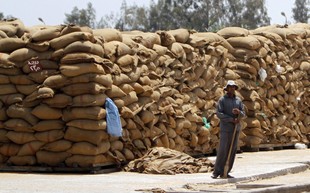 Image: A worker is seen at a wheat store after the harvest at Damanhour city in Al Beheira, governorate, about 135 km (84 miles) north of Cairo May 4, 2013. Picture taken May 4, 2013. REUTERS/Stringer
Image: A worker is seen at a wheat store after the harvest at Damanhour city in Al Beheira, governorate, about 135 km (84 miles) north of Cairo May 4, 2013. Picture taken May 4, 2013. REUTERS/Stringer
preview.reuters.com - July 11th, 2013 - Sarah McFarlane
Egypt has less than two months' supply of imported wheat left in its stocks, ousted President Mohamed Mursi's minister of supplies said, revealing a shortage more acute than previously disclosed.
Speaking to Reuters near midnight in a tent at a vigil where thousands of Mursi supporters are protesting against the Islamist president's removal, former Minister of Supplies Bassem Ouda said the state had just 500,000 tonnes of imported wheat left. Egypt usually imports about 10 million tonnes a year.
(VIEW COMPLETE ARTICLE)
Problem, Solution, SitRep, or ?:
Recent Comments